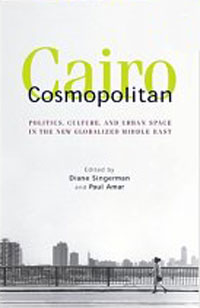A social and political geography of contemporary Cairo, this volume examines vernacular world-making through a "grounded cosmopolitan" approach that builds new interdisciplinary methods for Middle East studies.
Global stereotypes and certain social science agendas have tended to portray Cairo as a city of misery, a menacing population bomb, a morbid pharaonic tomb, or as the violent crossroads of the "Arab street." Today"s Arab world is often perceived to be overwhelmed by war, poverty, violence, and religious radicalism. However, this image ignores a vast array of new phenomena and contests that are remaking the Middle East. Cairo"s twenty-first century landscape is marked by surprising juxtapositions, where luxury malls compete with open-air markets, where gated communities grow on the ruins of socialist settlements, and where an Egyptian nationalistic renaissance meets new assertions of Nubian and transnational identity.
To challenge pervasive myths about Cairo, each chapter introduces the reader to a specific neighborhood and its contemporary concerns and then situates this local analysis within questions such as globalization, economic restructuring, cross-border migration, or state planning. Designed to cultivate a more pluralistic and dynamic appreciation of the region, Cairo Cosmopolitan offers an alternative starting point for learning about social change in the new Middle East.
Contributors: Mona Abaza, Paul Amar, Vincent Battesti, Asef Bayat, Fanny Colonna, Eric Denis, Dalila Elkerdani, Farha Ghannam, Galila El Kadi, Anouk de Koning, Petra Kuppinger, Anna Madoeuf, Catherine Miller, Nicolas Puig, Omnia El-Shakry, Yasser El-Sheshtawy, Diane Singerman, Elizabeth Smith, LeA?A?la Vignal, Caroline Williams. Это и многое другое вы найдете в книге Cairo Cosmopolitan: Politics, Culture, and Urban Space in the New Middle East (Diane Singerman, Paul Amar)
